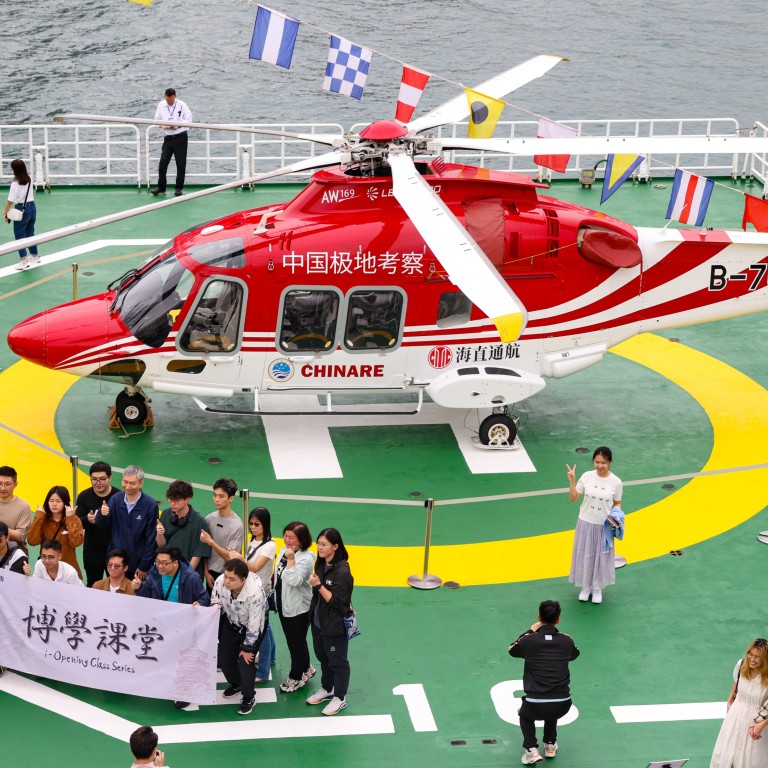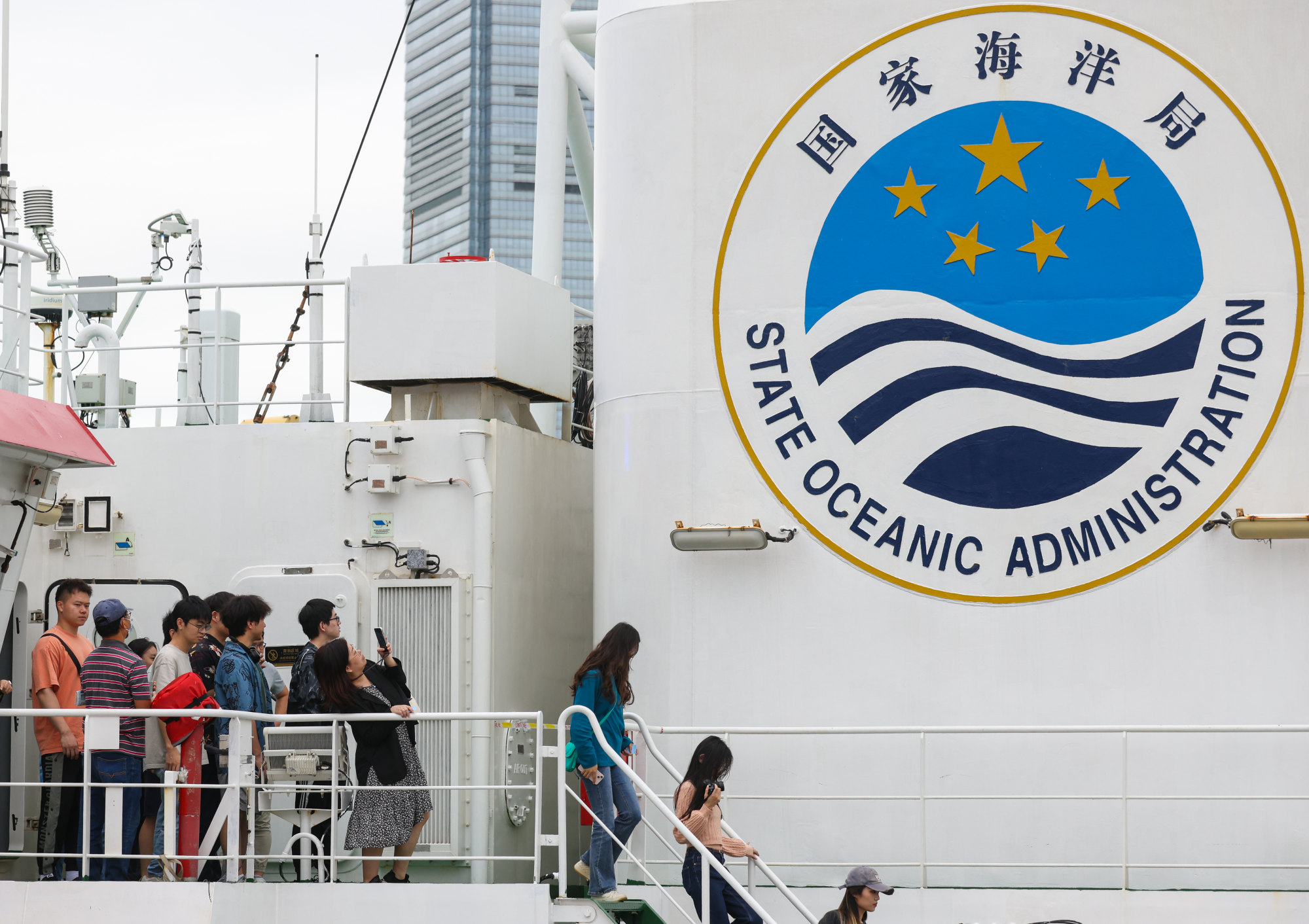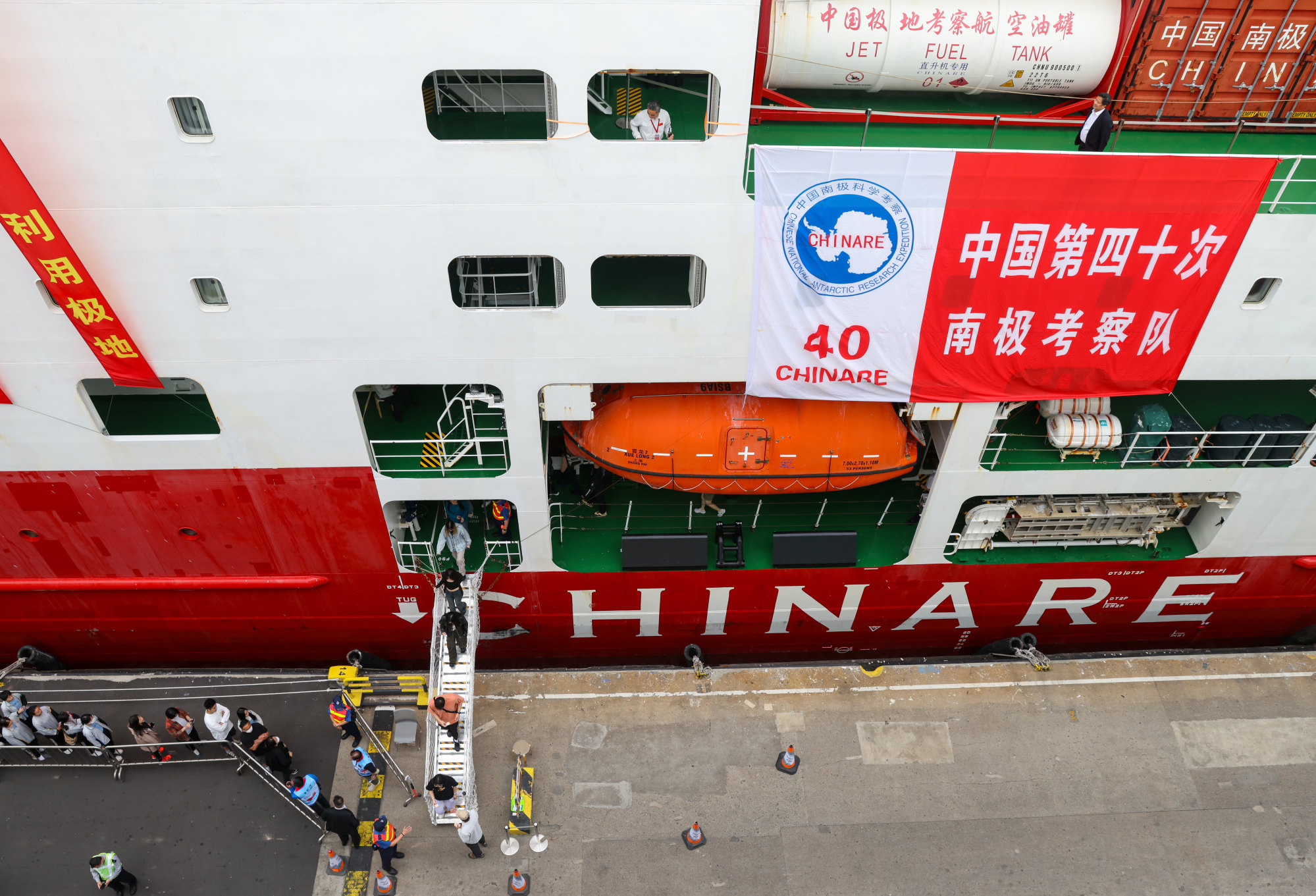
Chinese polar research icebreaker Xue Long 2 gets warm welcome as it opens to visitors in Hong Kong
- Xue Long 2 docks at Ocean Terminal in first visit to Chinese port on return from exploration of Antarctica
- First Hongkongers get to see the ship up close, including laboratories, its helipad and helicopter as it opens to visitors
Lacey Li, who is in her 40s, was among more than 60 people who boarded the ship after it opened to the public at 8.30am.
“It is very stunning,” she said. “Everything is well-organised and neat.”

Li took an hour’s leave from work to visit the ship at Ocean Terminal in Tsim Sha Tsui with her husband. She said she had paid extra attention to the layout of a laboratory on the ship as she worked for an architectural design firm.
Groups from universities, schools and companies were also among the first visitors to get a close-up view of the ship.
Visitors could access areas such as the marine sampling room and the laboratory, as well as the helipad, complete with the ship’s “Snow Eagle 301” helicopter.
Chow Tsz-tong, 17, a pupil at St Rose of Lima’s College, Sha Tin, said she was fascinated by the range of equipment on the ship.
“The most impressive part is how well-equipped the icebreaker is,” said Chow, part of a group of 13 pupils from the school. “I know it can be extremely cold in the Antarctic region and I was worried that scientists would be freezing while working.
“But I was told that there is automated temperature control in the vessel.”
Hong Kong role floated for icebreaker Xue Long 2’s future polar expeditions
Lin Mau-tong, the principal of St Rose of Lima’s, said the visit was a “rare opportunity” for her pupils to see some of the country’s scientific achievements.
Peng Zexin, a master’s student studying electrical and electronic engineering at the University of Hong Kong, said he was most interested in the array of devices and gadgets carried on the ship.
“I am particularly interested in the helicopter, the drone and sample collectors,” Peng said. “I find it interesting to see how they’ve already applied drones in polar research. Drones can go to areas that are difficult for humans to reach and help with the scientific assignments.”
The vessel is open free of charge to tours up to a maximum of 3,000 people between Tuesday and Friday. Pre-registration is needed for all visitors, but it appeared not everyone was aware of the requirement.
Sham Yung, a 77-year-old retired doctor, left the terminal disappointed because he did not get a visit registration in advance.
Hong Kong to receive icebreaker Xue Long 2 for first time in April
“We feel sorry that we don’t have the chance to visit the icebreaker,” said Yung, who wanted to see the vessel with two friends. “It is rare for a scientific research ship to come to Hong Kong so I am curious to see what is inside. I hope next time they can have a more accessible way for seniors to get tickets.”
The icebreaker’s visit coincided with a two-day conference on climate change organised by the Chinese University of Hong Kong.
Zhang Beichen, the deputy director of the Polar Research Institute of China, discussed the findings of its expeditions with a conference audience made up of scientists, researchers and policymakers from around the world and warned about the effects of climate change.
“When we arrived in Antarctica this year, we faced a situation in which the sea ice was already broken,” Zhang said. “We cannot use those samples. This is the first time in our 40 years of Antarctic expeditions.
“The South Pole is experiencing heatwaves and melting sheet ice that in the past three decades has caused sea levels to rise by 8mm.”
Lawmaker Ma Fung-kwok, chairman of the organising committee for the visit, said Xue Long 2’s adventures and discoveries would spark interest in scientific research and a sense of patriotism in Hong Kong’s young people.
“It is crucial for them to see first-hand the wonders and challenges of exploring the unknown, fostering a deep sense of curiosity, innovation and a desire to contribute to the world’s body of knowledge,” he said in a keynote speech at the event.
“This encourages our youth to partake in scientific endeavours with a sense of national pride and global responsibility. We aspire to see more young minds inspired by the Xue Long 2.”

He emphasised the need to create a generation that valued scientific exploration and cherished the planet. Ma appealed to young people to use their talent to advance science and technology.
Chinese University president Rocky Tuan Sung-chi told the gathering that dialogues between the expedition team and pupils from city schools would help motivate them to work for action on climate change.
“I am confident that their interactions will motivate our students, the leaders of tomorrow, to take climate action, especially as our coastal city becomes increasingly vulnerable to rising sea levels and extreme weather events resulting from climate change,” he said.
An exhibition on the topic and polar research is also running at the Hong Kong Science Museum until June.
Wang Jinhui, the expedition’s deputy leader, earlier said he hoped that Hong Kong’s scientists would take part in the ship’s work.
Professor Ho Kin-chung, founder of visit organisers the Green Future Foundation Association and Polar Research Institute of Hong Kong, added that mainland Chinese authorities had promised to include Hongkongers in future expeditions.



